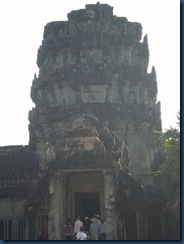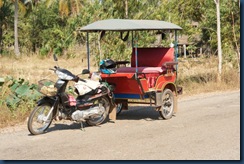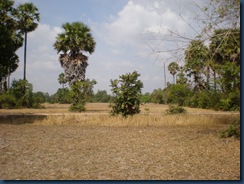Greetings dear friends at LCGS,
This is the second part of the article that I began in the last issue of the Wool Gatherings newsletter. The first part concentrated on my experiences in Thailand, specifically Bangkok, and the culture that is present in that area and windows for the Gospel to be heard. In this article I will discuss my experiences in Cambodia. We entered into Cambodia after a 40-minute flight into the city of Siem Reap. Our flight was on Bangkok Air, which advertises itself as a “boutique” airline. After receiving a hot, wet towlette before the flight took off we were given a full meal once we got in the air. Now, this was indeed a full meal, with a main course, vegetables or fruit, water, dessert and you had another complimentary beverage: juice, pop, wine or beer. No sooner than we had finished the main course of our meal, that we heard the pilot go over the intercom, “Flight Attendants, please prepare for arrival.” We then had about one minute to scarf down whatever food we might have or get it off the tray that was about to be picked up so we could hold it and finish what was left during the descent.
The reason that we went into Siem Reap was so that we could visit Angkor Wat, which was the royal temple built by the Angkor Empire around 1200 AD. The site covers a large area of  land with several temples and building dotting the landscape. Each building was built separately with the latest structure being built around 1500, close to the time the Martin Luther was reforming the Church. The main temple site was built around 1200 and is built like a fortress, with a moat surrounding it and a large wall protecting the temple at the centre of the complex. The temples were all originally built in accordance with the Hindu religion, but were defaced somewhat when a new emperor sympathetic to Buddhism came to power. Both of these religions still figure prominently in Cambodia and the religious landscape has the same flavour as that of Thailand. The history of the Angkor Empire would figure prominently more recently in Cambodia's history, which I will discuss later on. Visiting Angkor Wat gave us a glimpse into the religious and historical background of the people of Cambodia and also gave us an idea of their current culture.
land with several temples and building dotting the landscape. Each building was built separately with the latest structure being built around 1500, close to the time the Martin Luther was reforming the Church. The main temple site was built around 1200 and is built like a fortress, with a moat surrounding it and a large wall protecting the temple at the centre of the complex. The temples were all originally built in accordance with the Hindu religion, but were defaced somewhat when a new emperor sympathetic to Buddhism came to power. Both of these religions still figure prominently in Cambodia and the religious landscape has the same flavour as that of Thailand. The history of the Angkor Empire would figure prominently more recently in Cambodia's history, which I will discuss later on. Visiting Angkor Wat gave us a glimpse into the religious and historical background of the people of Cambodia and also gave us an idea of their current culture.
Cambodians are not as laid back and easy going as the Thai are, and are in fact much more pushy. When we arrived at Angkor Wat, the second we got off the tuk-tuk, the principle mode of transportation in Cambodia, we were swarmed by vendors trying to sell us wooden bracelets, post cards, or necklaces. They weren’t very old either, some of them not much older than eight years old. Yet they know every salesman trick in the book and every capital of any country you tell them. On Sunday morning we left Siem Reap and took an eight hour bus ride to Phnom Penh, Cambodia’s capital city. Upon arriving at Phnom Penh, we got swarmed by tuk-tuk drivers offering us rich looking foreigners a ride to a hotel or wherever we needed to go, something that would not happen in Thailand. At times it was almost smothering and annoying, yet the differences between Cambodia and Thailand were apparent almost immediately. The people certainly have more need here, and the country in general is a little less developed. Often when having to choose between school and work, parents will have to send their children to work so that their family can make a buck or two and pay for a plate of food.
looking foreigners a ride to a hotel or wherever we needed to go, something that would not happen in Thailand. At times it was almost smothering and annoying, yet the differences between Cambodia and Thailand were apparent almost immediately. The people certainly have more need here, and the country in general is a little less developed. Often when having to choose between school and work, parents will have to send their children to work so that their family can make a buck or two and pay for a plate of food.
On Monday morning we visited a Church near a village about three hours outside of Phnom Penh. After travelling about ten minutes down a poorly maintained dirt road we came upon a rice farm where the congregation gathers for their worship service. They don’t have a building or any of the trappings that we associate with Church (altar, communion ware, paraments, vestments) yet they still gather in Christ’s name and worship their Lord and Saviour. They meet on the field that the pastor owns and works with his family (in the rainy season they meet  on the road) and have service and a Sunday School. When we arrived, several of the children were singing songs and playing out Bible stories, such as the Prodigal Son, for us and then a worship service. The Lutheran Church in Cambodia is currently learning the liturgy and have begun to learn Responsive Prayer 2 in LSB. Though most Cambodians are illiterate, and those who are educated have about a fourth grade education, the pastor and the deaconesses of the Church help the people learn it. Because of the problem of drunkenness and violence among men in the area, the Church usually makes inroads first to the women, who then talk to their husbands and start to bring them to church as well. But this is a slow process and as a result some of the churches in Cambodia are completely made of women, which makes the work of the deaconesses so important. Usually they are called on to be the shepherds for these congregations of women and will preach and lead worship until men start coming in to the church, at which point they will select one as their pastor and he will begin training and leading worship for the community.
on the road) and have service and a Sunday School. When we arrived, several of the children were singing songs and playing out Bible stories, such as the Prodigal Son, for us and then a worship service. The Lutheran Church in Cambodia is currently learning the liturgy and have begun to learn Responsive Prayer 2 in LSB. Though most Cambodians are illiterate, and those who are educated have about a fourth grade education, the pastor and the deaconesses of the Church help the people learn it. Because of the problem of drunkenness and violence among men in the area, the Church usually makes inroads first to the women, who then talk to their husbands and start to bring them to church as well. But this is a slow process and as a result some of the churches in Cambodia are completely made of women, which makes the work of the deaconesses so important. Usually they are called on to be the shepherds for these congregations of women and will preach and lead worship until men start coming in to the church, at which point they will select one as their pastor and he will begin training and leading worship for the community.
Much of the educational problems that occur in Cambodia stem from an era in the mid to late 1970s, during a period when a communistic ruler named Pol Pot came to power. One of the objectives of Pol Pot was to turn the clock back and remake Cambodia into the Angkor Empire, what was perceived as the golden age for Cambodia. This meant forcing the people out of the cities onto the farms to create a completely agrarian society. Like most totalitarian regimes of the twentieth century there was a constant suspicion of revolt, thus the educated and intelligent class of Cambodia were persecuted as enemies of the state. This meant that all those who were educated, and those who wore glasses because that’s a sign of intelligence, were put into prison and were tortured until they confessed to plotting against the government. Once they confessed they were then sentenced to death and would be executed in a field that became known as the Killing Fields where they would be buried in mass graves. Our group visited both one of these prisons as well as the Killing Fields. It was a sobering experience that gave all of us a deep look into the sinfulness of man and cruelty our sinful nature is capable of doing. The result of this genocide is seen today in the lack of education that the people have in Cambodia.
Once again, there is so much that I could tell you about my experiences in Cambodia, but I have tried to stick with the highlights and give you glimpse into this foreign culture. We did not get to spend as much time out on the town at night, but we did get to enjoy the Russian market in downtown Phnom Penh, where one of my classmates bought a copy of the movie Avatar months before it came out on DVD. We enjoyed a dinner at the Foreign Correspondents Club, where foreign correspondents used to stay when visiting Cambodia, and a dinner at a fancy restaurant with one of the missionaries from the LCMS and his family. It was a wonderful time and I enjoyed my experience, though at this time I was starting to get ready to come home and missing the familiar food of home. The next article will give a summary of the trip and look at what I was able to get from the whole experience.